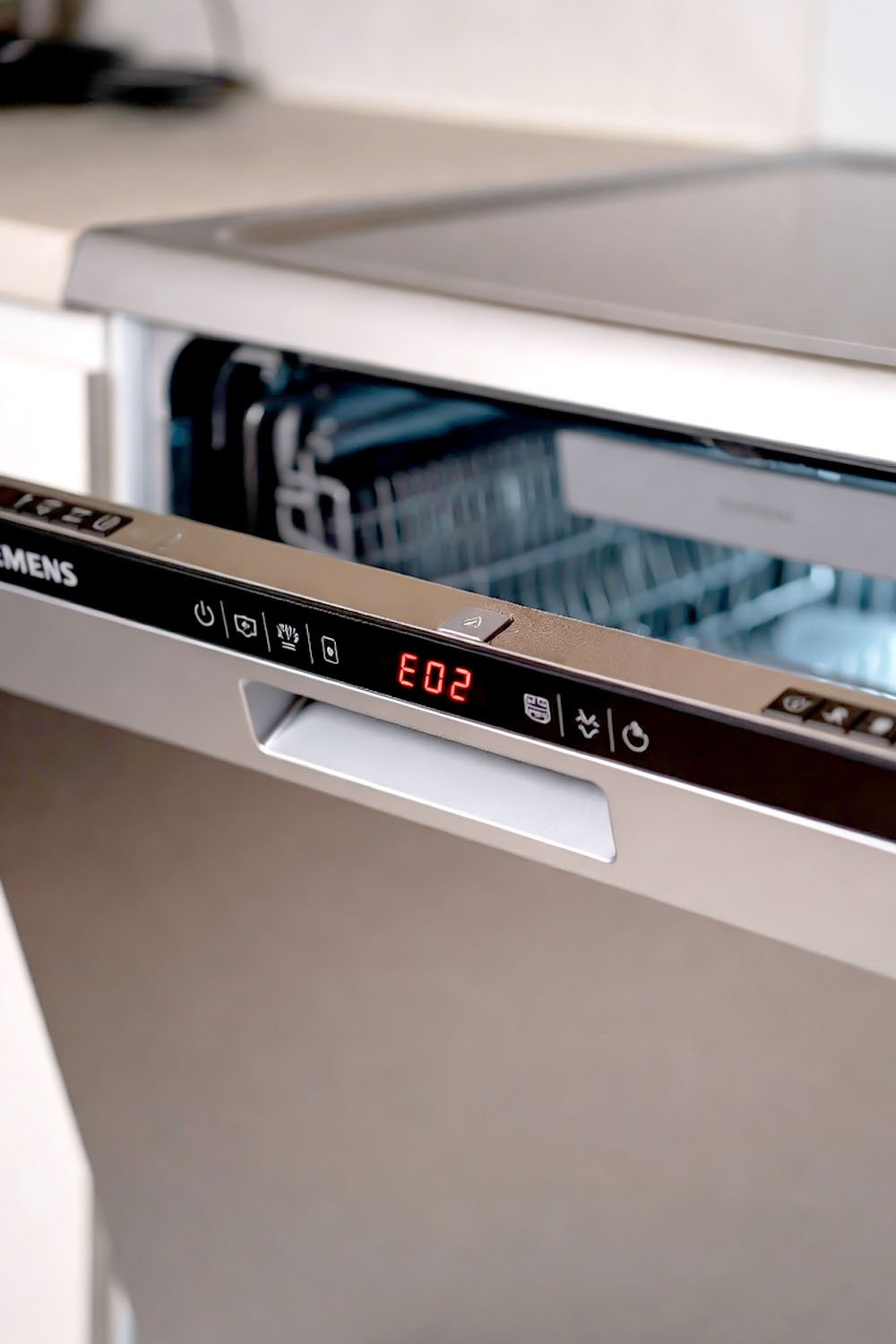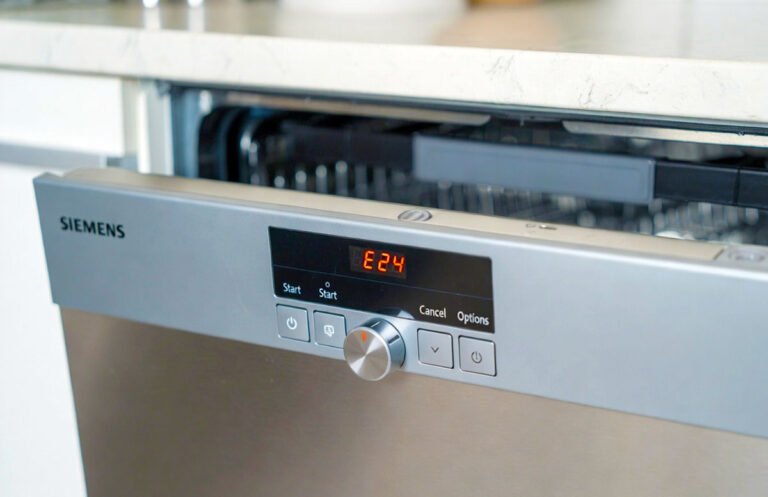As an Amazon Associate, I earn from qualifying purchases at no extra cost to you.
Neff Dishwasher Not Heating Water? Quick and Easy Fixes
When your Neff dishwasher is not heating water, the quick answer is that it usually happens because of a faulty heating element, thermostat, or control board. Fixing it is possible with some checks and care. Most of the time, it is not a big disaster, but leaving it too long can cause bigger problems. Do not worry, because I will walk you through everything. You will learn how to find the issue, what you can do, and when to call for help.
Check the Power and Settings
The first and simplest thing to do is to check if your dishwasher is getting proper power. Sometimes, the issue is not with the heater but with the electricity. A loose plug, a tripped breaker, or a damaged socket can cause the heating system to stop working. It sounds simple, but many people miss this easy step.
Next, look at the dishwasher settings. Some programs run at lower temperatures, and they may not seem hot to the touch. If you pick an eco or quick cycle, the water might not heat up enough. Always check the user manual for the right program. If you want hotter water, select an intensive or heavy-duty wash.
It is also smart to reset the dishwasher. Unplug it for a few minutes, then plug it back in. Many times, this clears small errors in the system. Dishwashers have sensors and electronics, and sometimes they just freeze like a computer. A reset is a quick way to try before looking deeper.
While checking, notice if the dishwasher is showing error codes. Most modern Neff models display codes on the panel. These codes guide you about the issue. Look up the code in your manual or online. It is very helpful, and you can often find the direct cause without guessing.
- Check the plug, socket, and breaker
- Confirm the wash program is not a low-heat cycle
- Try a reset by unplugging
- Look for error codes on the display
Inspect the Heating Element
The heating element is the main part that warms the water. If it burns out, your dishwasher will not heat no matter what. You can usually see the element at the bottom of the dishwasher tub. It looks like a small metal bar. If it is broken, cracked, or has burn marks, that could be the reason.
You can test the heating element using a multimeter. Set it to resistance mode and place the probes on each end of the element. A good element will show continuity. If there is no reading, the element is faulty and needs replacement. Do not worry, many repair shops or online stores sell Neff dishwasher parts.
Replacing the heating element is not too hard, but it does require care. First, unplug the dishwasher and turn off the water supply. Then remove the lower panel and disconnect the wiring from the element. After that, you can slide out the bad element and put the new one in place. Always make sure the connections are tight before closing everything back.
If you do not feel confident, it is fine to call a professional. Dishwashers mix water and electricity, which can be risky. However, many DIY users replace heating elements successfully, and it saves money compared to service costs. Just follow clear instructions and take your time.
- Heating element is the main water heater
- Look for visible damage like cracks or burns
- Test with a multimeter for continuity
- Replace carefully or call a professional
Look at the Thermostat and Sensors
Even if the heating element works, the thermostat or temperature sensors control how hot the water gets. If the thermostat fails, it may think the water is already hot when it is not. That means it will stop sending power to the heater.
To check, you can again use a multimeter. Remove the thermostat carefully and test for continuity. A good thermostat will show readings, but a bad one will stay open. If you find it is faulty, it must be replaced. They are not very costly, and many dishwasher owners replace them without much trouble.
Sensors, on the other hand, are usually small electronic parts that measure water temperature. When they fail, the dishwasher might stop heating because it gets the wrong signal. Sometimes cleaning them helps if dirt or limescale covers the sensor. Use a soft brush and vinegar to clean the area gently.
Do not ignore signs like cycles ending too early or dishes still dirty. These are classic hints that the sensors or thermostat are not working right. If your Neff dishwasher suddenly washes too quickly, that is a strong clue. Replace the part to get full heating power back.
- Thermostat controls water heat level
- Faulty thermostat or sensor can block heating
- Test with a multimeter for readings
- Clean dirty sensors or replace bad ones

Examine the Control Board
The control board is like the brain of your dishwasher. It sends signals to the heating element, thermostat, and pumps. If the board has a fault, the heating part may never get the signal to turn on.
You might notice other strange behaviors if the board is failing. For example, cycles may stop in the middle, lights may flash, or buttons may not respond. These are all signs of a weak control board.
Repairing a control board is not always simple. Sometimes, small parts like relays or burnt tracks can be fixed if you know electronics. But most people choose to replace the whole board. It can be a little costly, but it restores your dishwasher to full working order.
Before replacing, double-check that the issue is not from the heating element or thermostat. Only after confirming those parts are fine should you suspect the board. This avoids wasting money. A technician can test the board and confirm if it is the cause.
- Control board sends signals to heating parts
- Faulty board shows random cycle problems
- Repairs are complex, replacement is common
- Always confirm other parts before replacing
Remove Limescale Build-Up
Hard water is a big enemy of dishwashers. Over time, limescale builds up inside the heating element, sensors, and pipes. This stops heat transfer and makes the heater work harder. In the end, your Neff dishwasher may stop heating water properly.
You can fight limescale by using a dishwasher cleaner or descaler. Run a hot empty cycle with the cleaner. Vinegar is also a cheap option. Pour a cup into the bottom and run the hottest cycle. Do this every month if your water is hard.
Cleaning the filters and spray arms also helps. When they are blocked with scale or grease, the dishwasher does not work well. Water may not reach the heater properly. Always keep these parts clean for the best performance.
If you live in a very hard water area, think about installing a water softener. This reduces limescale not just in your dishwasher but also in all home appliances. It is an investment that pays back in longer life for your machines.
- Limescale blocks heating performance
- Use descaler or vinegar cycles to clean
- Keep filters and spray arms clear
- Consider a water softener for hard water areas
Know When to Call a Professional
Even with all these checks, sometimes the problem is beyond what you can fix at home. That is when it is best to call a professional repair service. Neff dishwashers are high-quality, but their parts can be complex. A trained expert can find and fix the fault quickly.
If your dishwasher is still under warranty, do not try to repair it yourself. Always contact the official service center first. DIY work may cancel the warranty. It is smarter to let the company fix it free or at a lower cost.
Also, if you are not comfortable handling electricity, do not push yourself. Safety comes first. It is better to spend a little money on a repair than risk getting hurt. Dishwashers use both water and power, so the risk is real.
A professional can also tell you if the dishwasher is worth fixing. Sometimes, old machines cost more to repair than to replace. Getting advice helps you make the best decision.
- Call a professional if unsure about the repair
- Use warranty services if still covered
- Safety comes before DIY work
- Get advice on repair vs replacement
Final Thoughts
A Neff dishwasher not heating water can be very frustrating. But most of the time, the fix is simple and does not mean replacing the whole machine. Start with power checks, then move step by step to the heating element, thermostat, control board, and limescale. If nothing works, a professional can solve it. Taking quick action saves you stress, money, and gives your dishwasher a longer life.
| Problem | Reset or check the plug | Possible Fix |
|---|---|---|
| No heat at all | Power and settings | Reset or check plug |
| Water cold | Heating element | Test or replace |
| Water not hot enough | Thermostat or sensor | Clean or replace |
| Strange cycles | Control board | Replace if faulty |
| Scale build-up | Hard water | Clean with descaler |
| Unsure what to do | Complex issue | Call professional |
Frequently Asked Questions (FAQs)
Is it safe to run my Neff dishwasher if the water is not heating?
It is usually safe, but it will not clean dishes properly. Cold water cannot remove grease or kill bacteria. You may notice cloudy glasses, dirty plates, and bad smells. Over time, running it like this may also cause more wear on the motor and pump because cycles might run longer. So while it will not break instantly, it is better to fix the heating issue soon.
Can a Neff dishwasher heat water without the heating element?
No, it cannot. The heating element is the main part that warms the water. Without it, the water stays cold. Other parts like the thermostat or control board only control when and how the element works. If the heating element burns out, the dishwasher loses its heating ability completely. Replacing the element is the only way to restore hot water.
Do I need special tools to replace a Neff dishwasher heating element?
You do not need many special tools. A screwdriver, pliers, and a multimeter are usually enough. The multimeter helps test the element before replacing it. Always unplug the dishwasher before working on it. If you are not used to handling electrical parts, it might be safer to call a repair technician. But many people replace the part successfully with basic tools.
Is it possible for limescale to stop my Neff dishwasher from heating?
Yes, limescale is a very common reason for heating problems. It coats the heating element and sensors, making them less effective. Over time, the dishwasher struggles to heat water at all. Using a descaler or vinegar once a month can prevent this. If you live in a hard water area, a water softener is a smart choice. It protects your dishwasher and other appliances too.
Can the control board be repaired instead of replaced?
Sometimes yes, but it depends on the damage. If only a small part like a relay is burnt, a skilled technician can fix it. However, most repair shops suggest replacing the whole board because it is quicker and more reliable. Repairing requires special knowledge in electronics. For most people, replacement is the better option, even if it costs a little more.
Do I void my warranty if I try to repair my Neff dishwasher myself?
Yes, in most cases. If your dishwasher is still under warranty, do not try to fix it yourself. Doing so may cancel your coverage. Always check the warranty terms before touching the parts. The best option is to contact the official Neff service center. They may repair it free or at a low cost. Once the warranty ends, you can try DIY repairs if you want.
Is it normal for some Neff dishwasher cycles to feel cold?
Yes, it depends on the program you select. Eco or quick cycles use lower water temperatures to save energy. If you open the door during these cycles, the water may feel cold or just warm. But for intensive cycles, the water should be hot. If even the hottest program feels cold, then you likely have a heating problem.
Can I still wash dishes by hand while waiting to fix my Neff dishwasher?
Of course, you can. Washing by hand is a simple backup option. Use hot soapy water and scrub well. It takes more time, but it ensures your dishes stay clean while your dishwasher is down. Many people go back to handwashing temporarily when waiting for parts or repair service. Once fixed, your dishwasher will be ready again for daily use.








